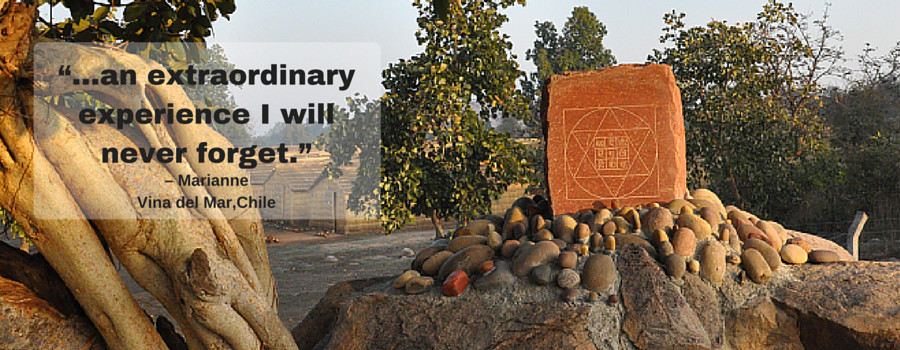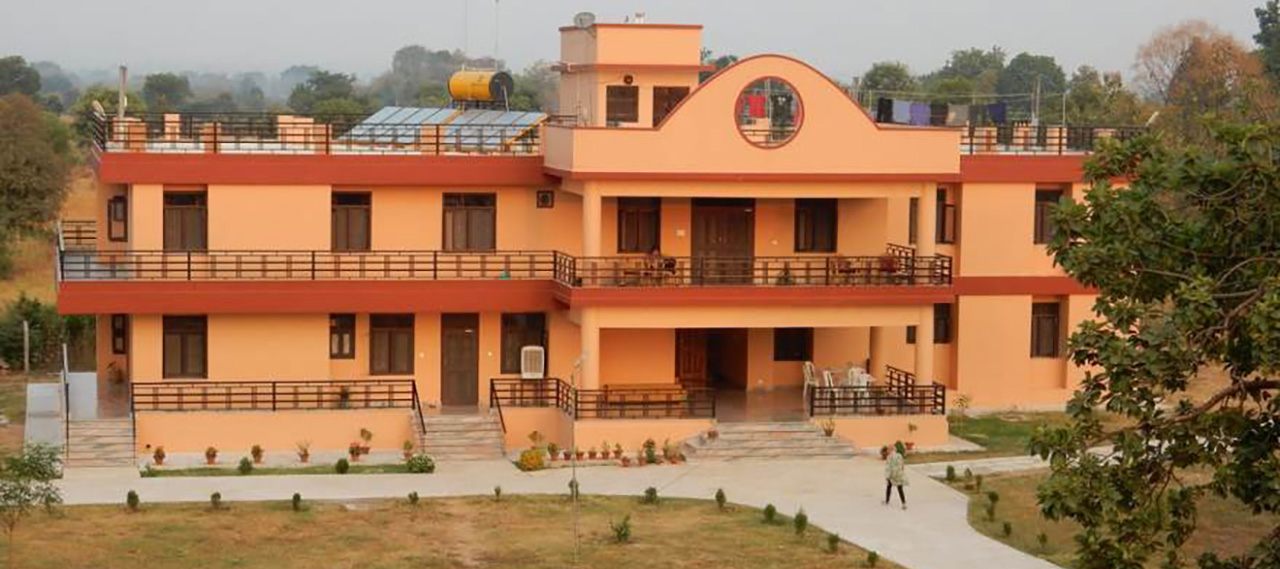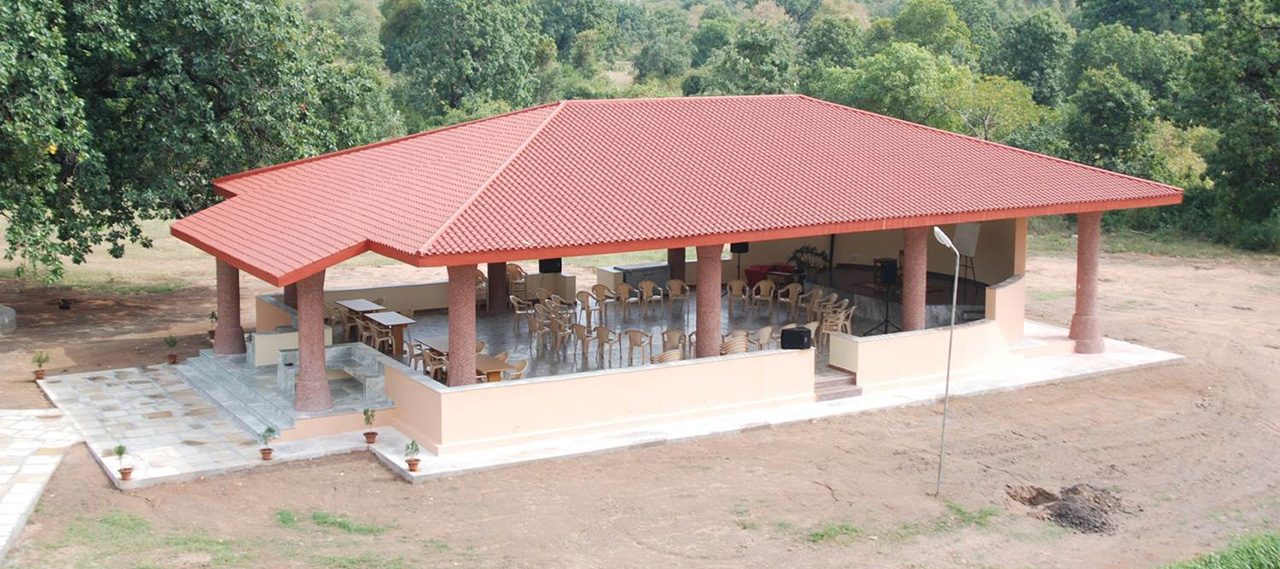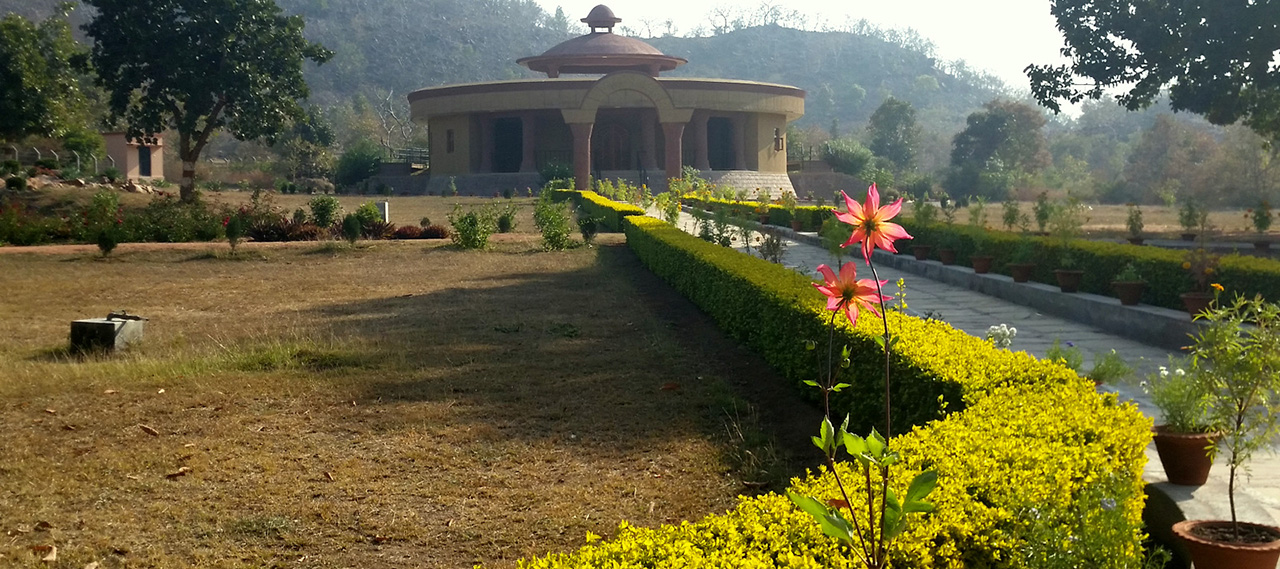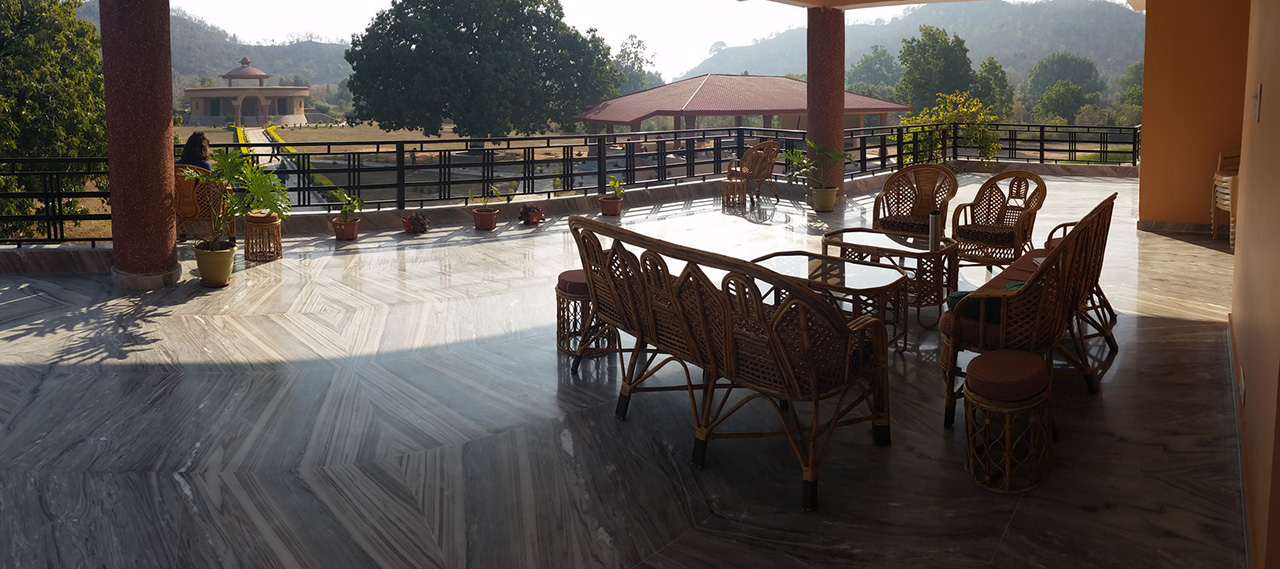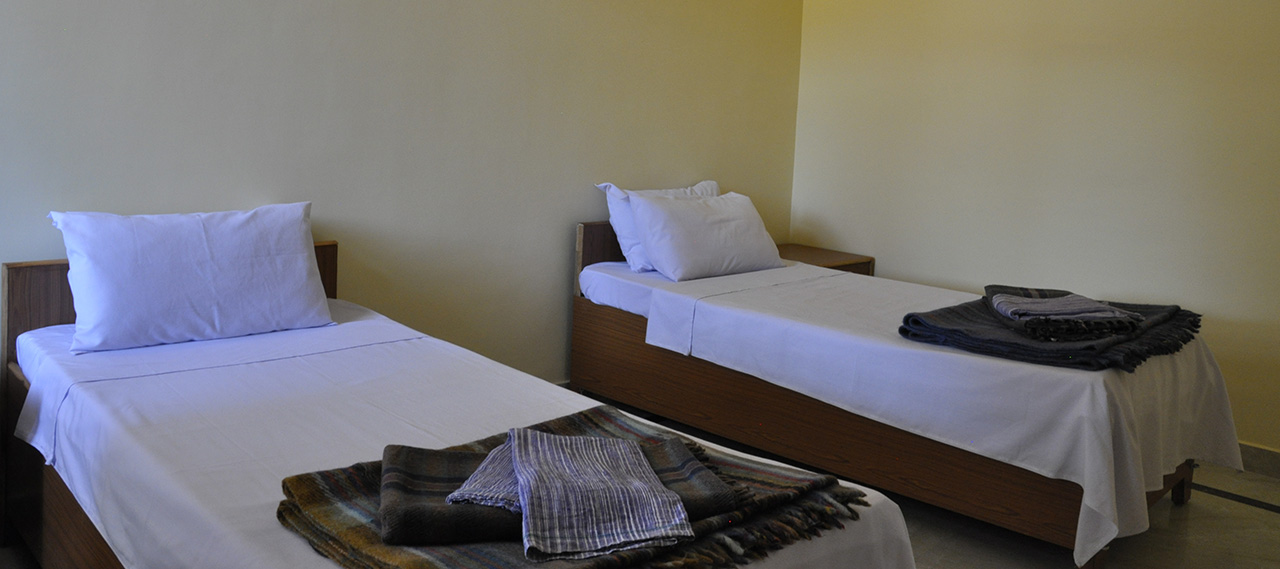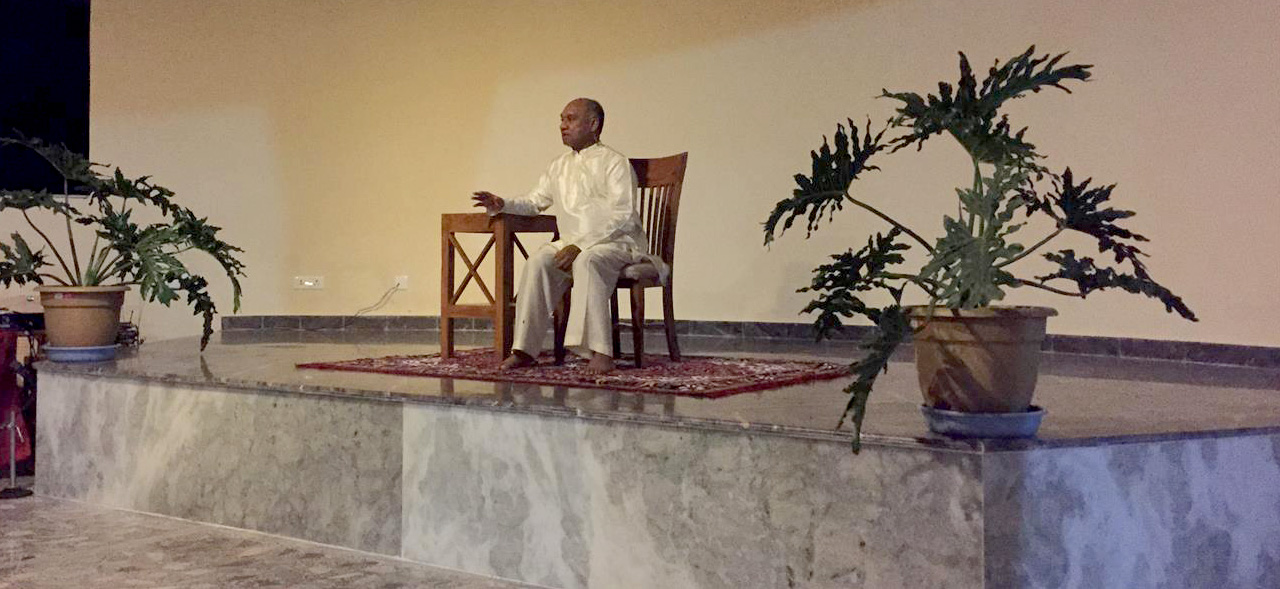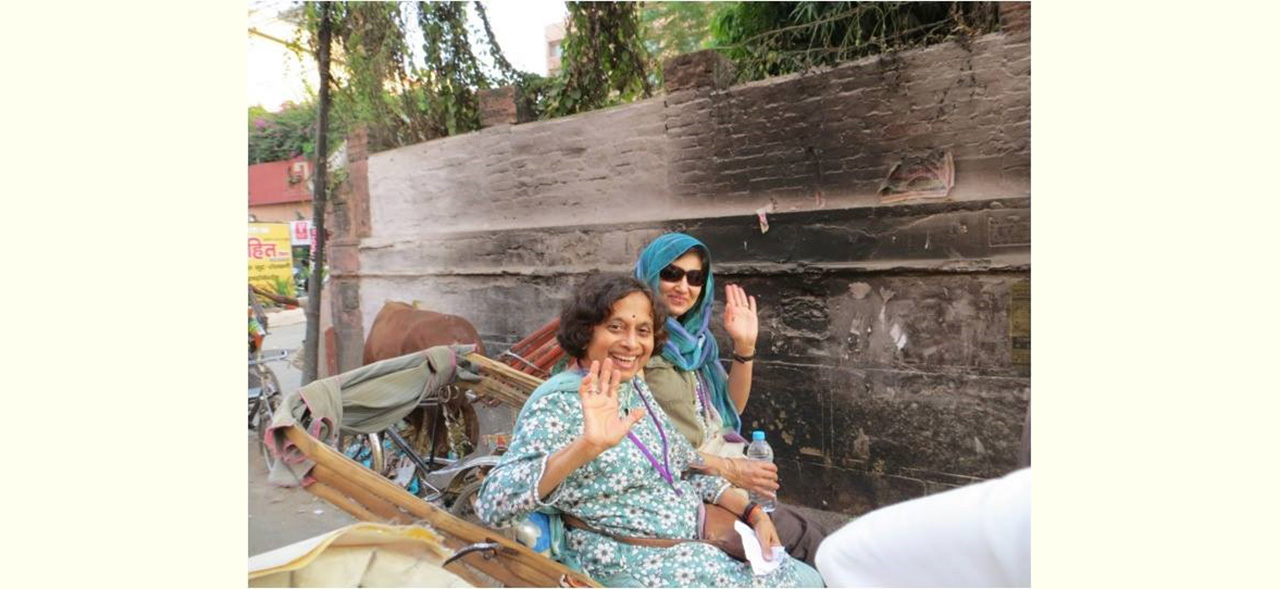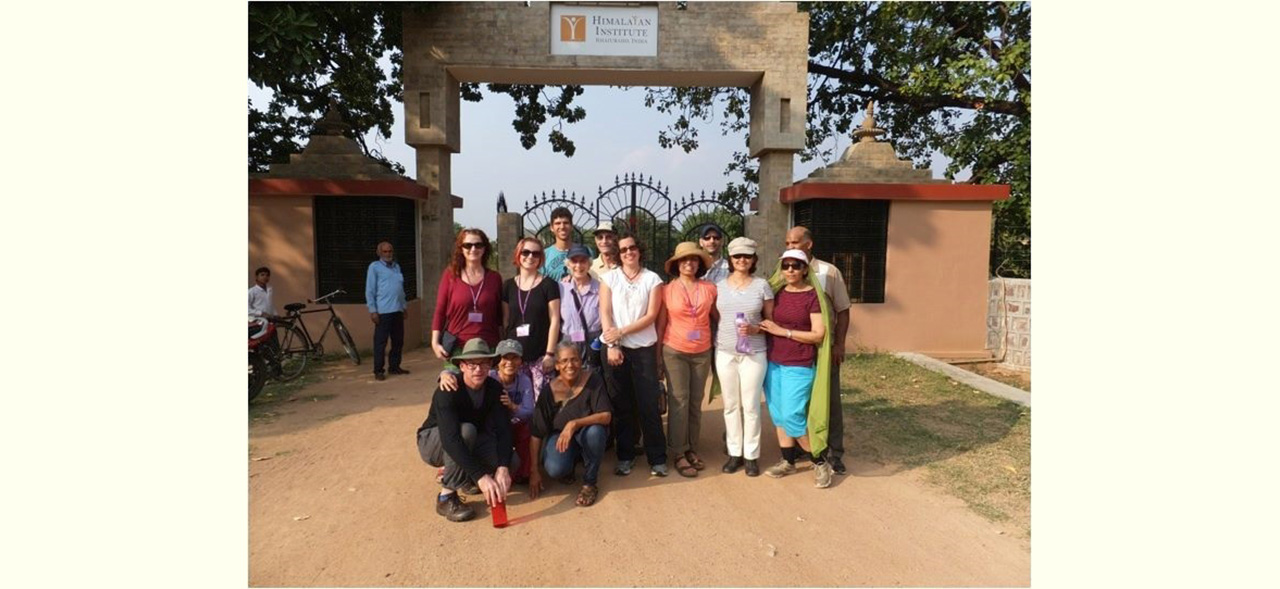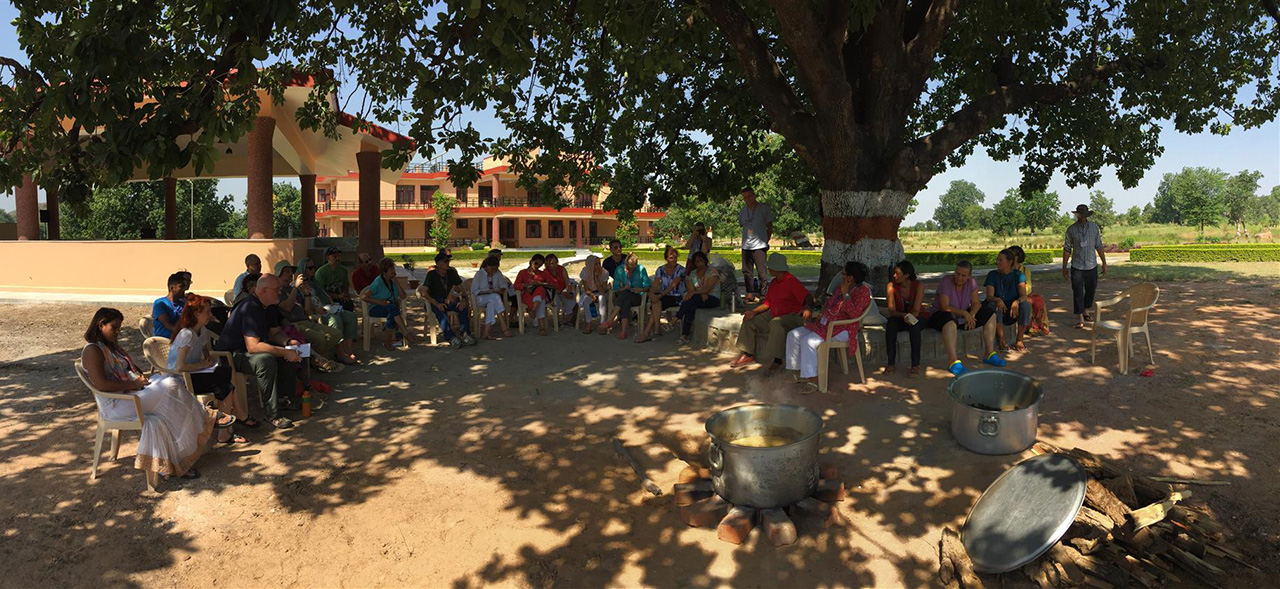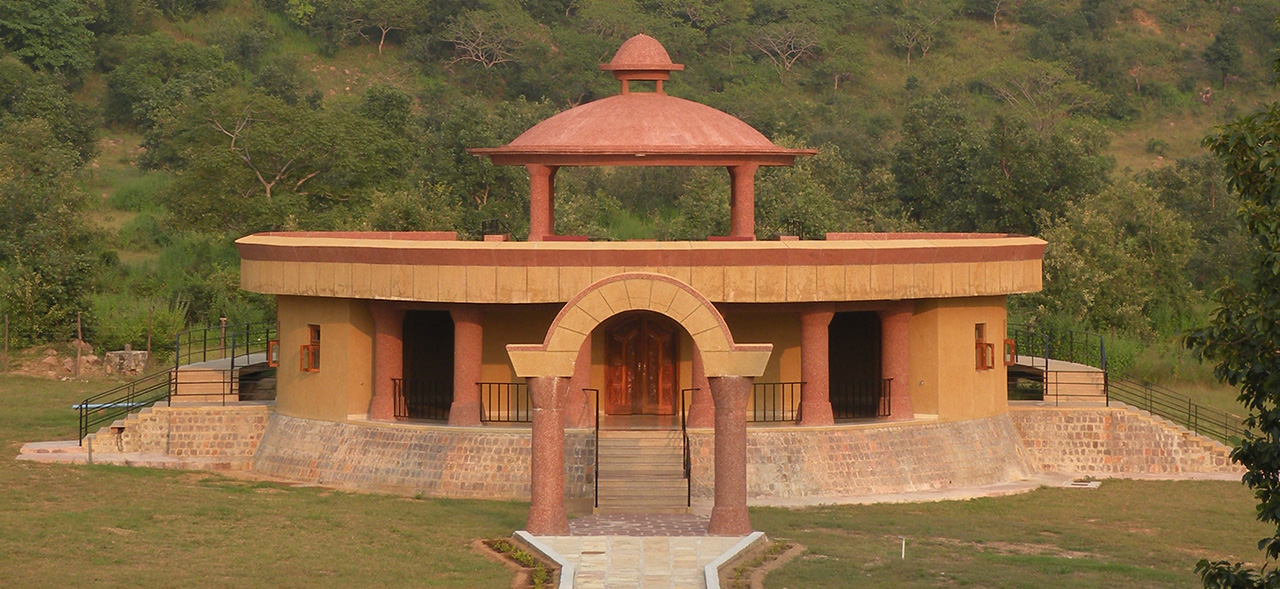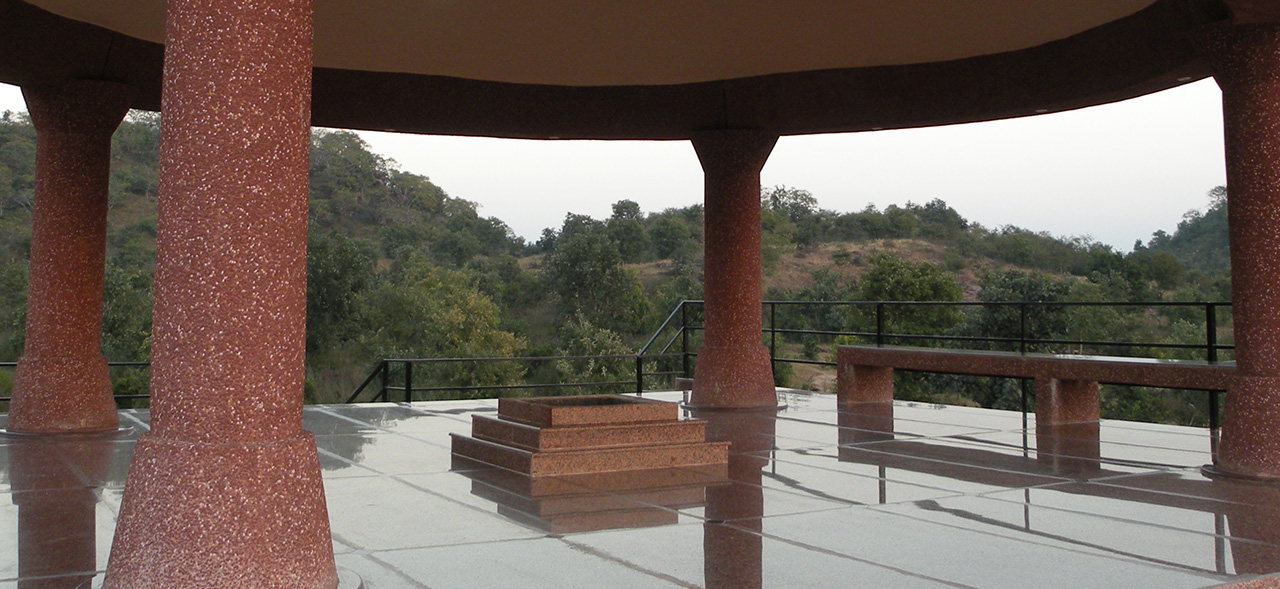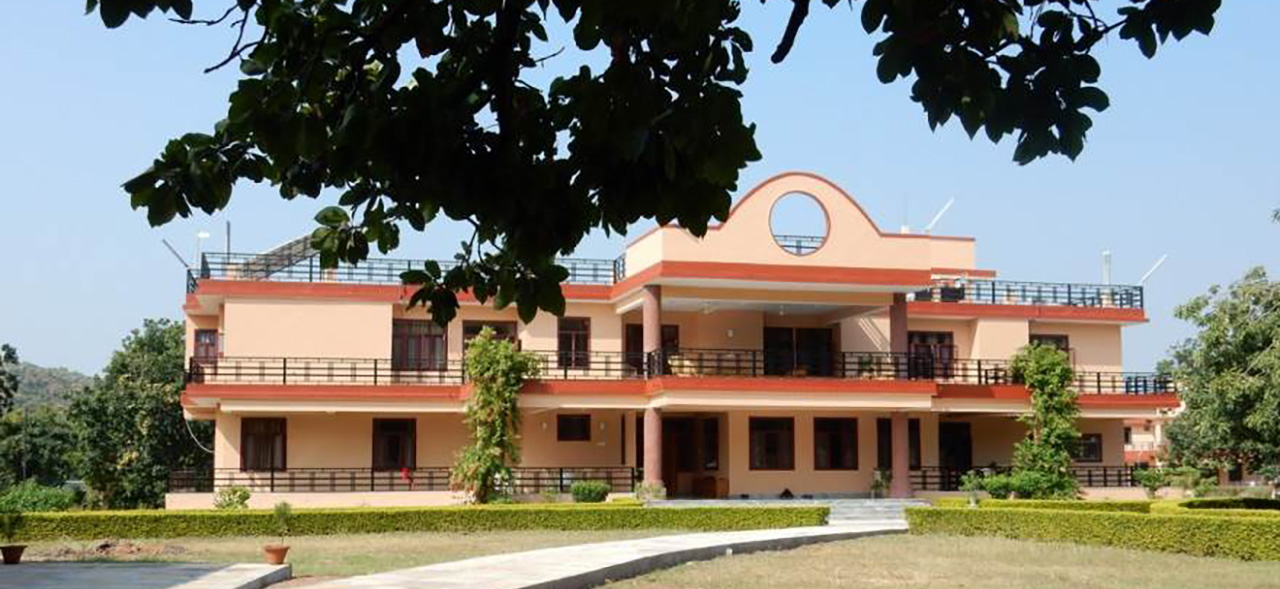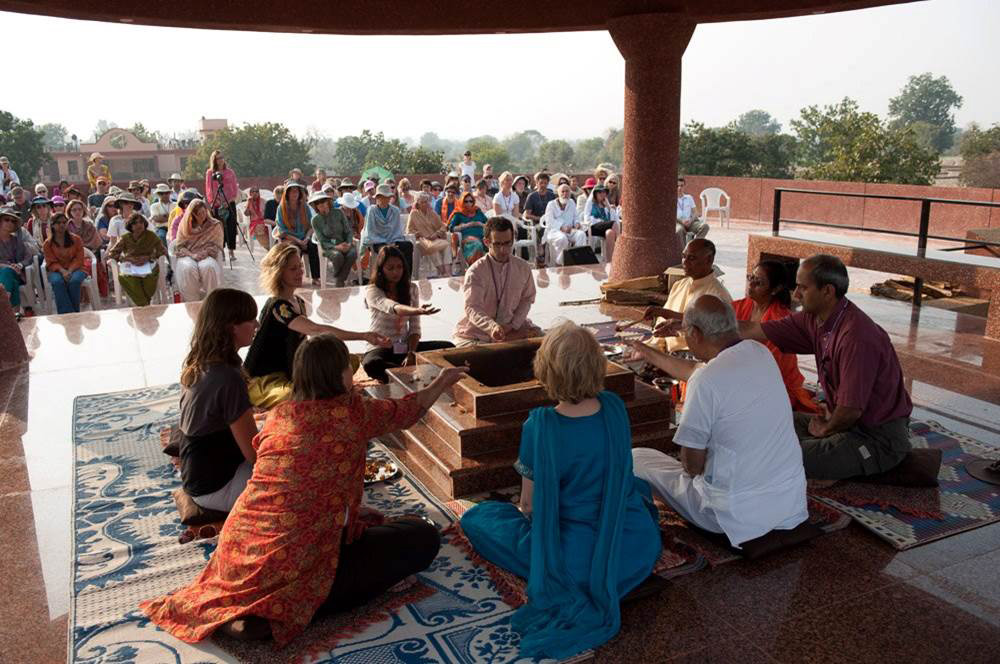
Join us on this practice‐driven pilgrimage to the Sri Vidya Shrine at Himalayan Institute Khajuraho.
Khajuraho Sadhana Immersion is a practice-driven pilgrimage centered on the Sri Vidya Shrine. In January 2013, hundreds of practitioners undertook a three-year practice to consecrate the Sri Vidya Shrine in Khajuraho, India. Today the Sri Vidya Shrine is established, welcoming a limited number of seekers from around the world.
Whether you’re new to the Himalayan Institute Khajuraho, or a returning student, we invite you to join Pandit Rajmani Tigunait, PhD, and other like-minded seekers to immerse yourself in the energy of the Shrine. This pilgrimage is a rare opportunity to deepen your practice and connection with the living tradition of the Himalayan Masters by infusing your mind and heart with the stability, peace and inner illumination that fills this sacred space. The Sri Vidya Shrine in Khajuraho resonates with the gift of love and inner peace offered by the masters of the Himalayan Tradition— step back from the modern, fast-paced, chaotic world to take in a lifechanging experience that will help you find lasting fulfillment.
The Sri Vidya Shrine and the Himalayan Institute India (“HI”) campus offer all that drew yogis and aspirants to the Himalayas in ancient times— extraordinary beauty, serenity, and spiritual energy that spontaneously transports us to our pure and pristine inner core. The Sadhana Immersion in this spiritually uplifting oasis is designed to help you accelerate your practice and become more firmly established in your experiential wisdom. The structured practice of hatha, pranayama, meditation, prayer, purashcharana, and personal guidance from Pandit Rajmani Tigunait, PhD are the central elements of this experience. But the most important element is the environment, which cannot be replicated.
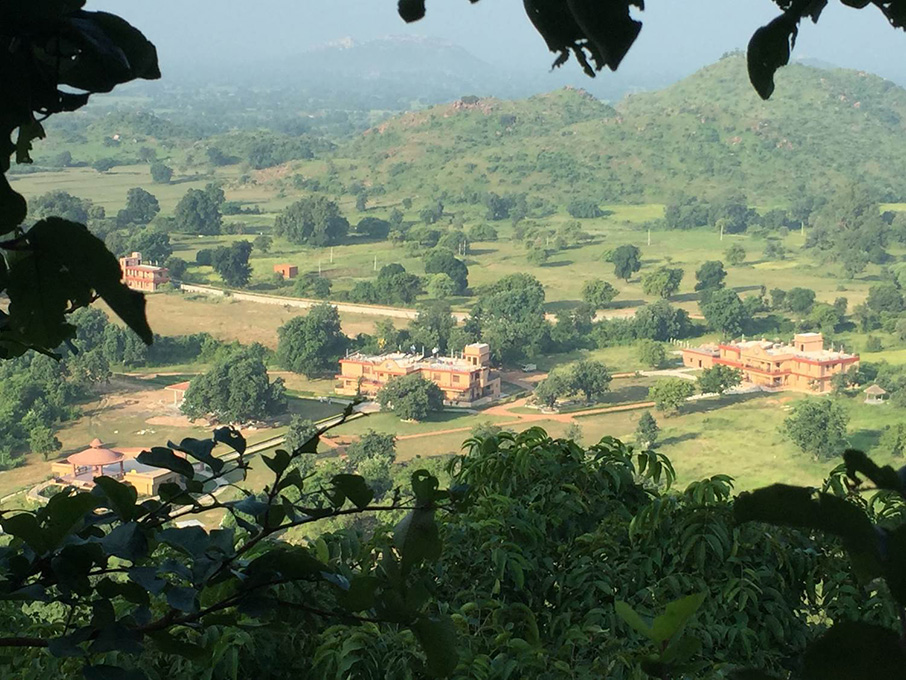
- Emphasis on spiritual practice.
- Limited to small groups of 45 like-minded seekers for a more personal experience.
- Comfortable accommodations with en suite bath.
- An opportunity to make appointments for spiritual guidance and/or initiation into the Himalayan Tradition.
- Morning and evening prayers in the Sri Vidya Shrine.
- Evening Satsang with Pandit Rajmani Tigunait, PhD
- Group havan (fire ceremony), kirtan, nature hikes, workshops, prayers study group, guided yoga/meditation classes or other activities.
- Free time for your spiritual practice, study, reading, journaling, walks, and contemplation.
- Access to the HI Khajuraho reference library.
- Optional day trip to Khajuraho for a visit to the World Heritage Site temple complex, shopping, and internet or wi-fi services at the local cyber “cafes.”
- Optional day trip to the nearby shrine of Jatashankar or other nearby shrine.
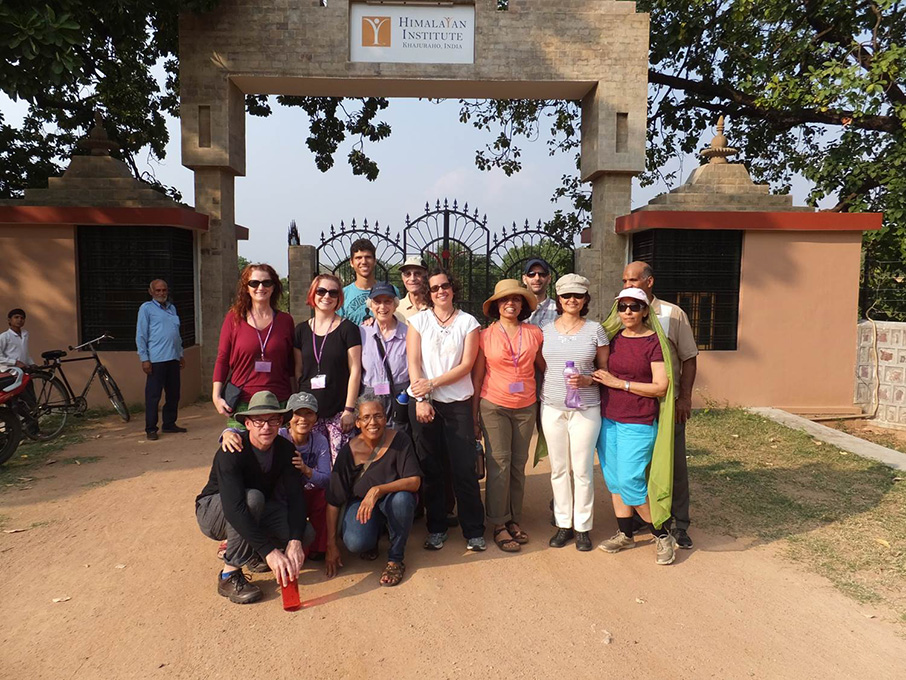
The Institute’s 30-acre campus is the ideal setting for sadhana. Surrounded by hills and forest preserves, it is blessed with natural beauty and tranquility. Here you will experience heaven on earth. The Sri Vidya Shrine awaits you in this idyllic setting. The shrine’s Sadhana Chamber and Maha Mandapa are open for daily meditation practice. The Garbha Griha, the innermost chamber of the shrine, is open during specific hours so you can pay your respects to the Sages of the Himalayan Tradition.
Key amenities are provided for your comfort:
UV purified and filtered drinking water, meals freshly prepared from locally grown produce, and comfortable indoor accommodations with en suite baths.
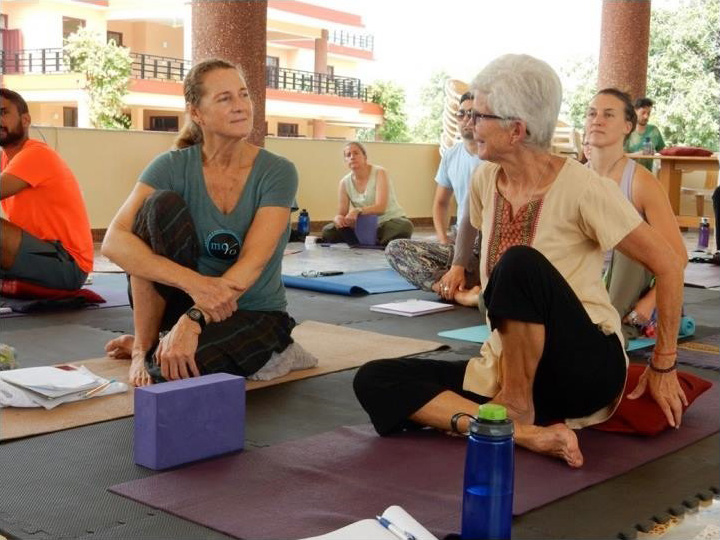
Guest Accommodations & Amenities
Khajuraho—India’s Mystical Matrix
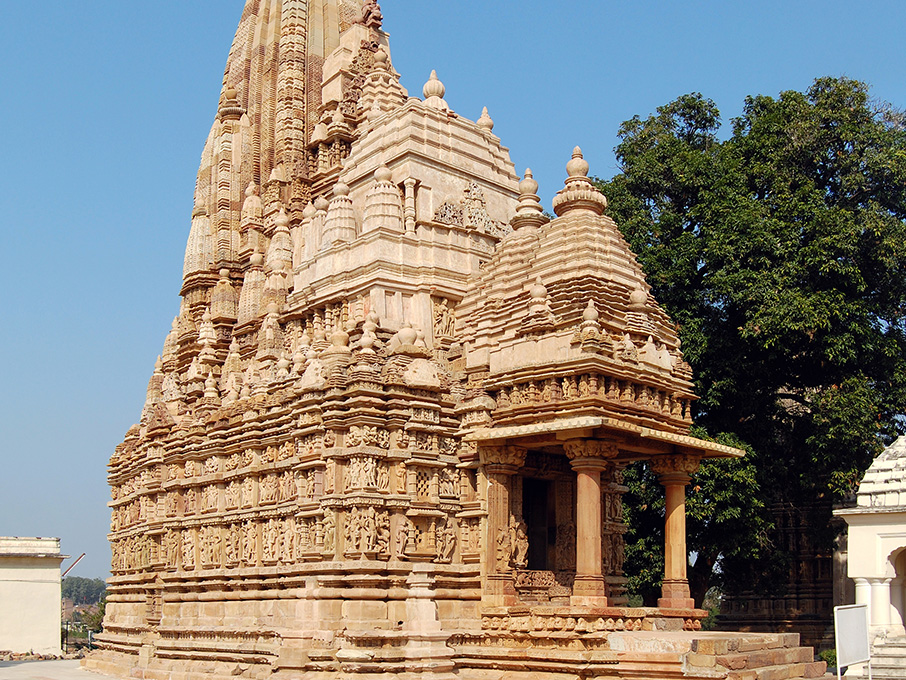
Khajuraho has been a stronghold of tantric practice for untold ages. Visitors from around the world flock to this renowned UNESCO World Heritage Site, located 7 miles (11 km) from our campus, to see its perfect blend of art and architecture—22 magnificent temples covered with the motifs of gods and goddesses in erotic embraces. For tantric practitioners and adepts, Khajuraho is the place where the sacred and the mundane merge. The Institute’s campus is here on this meeting ground of human and divine.
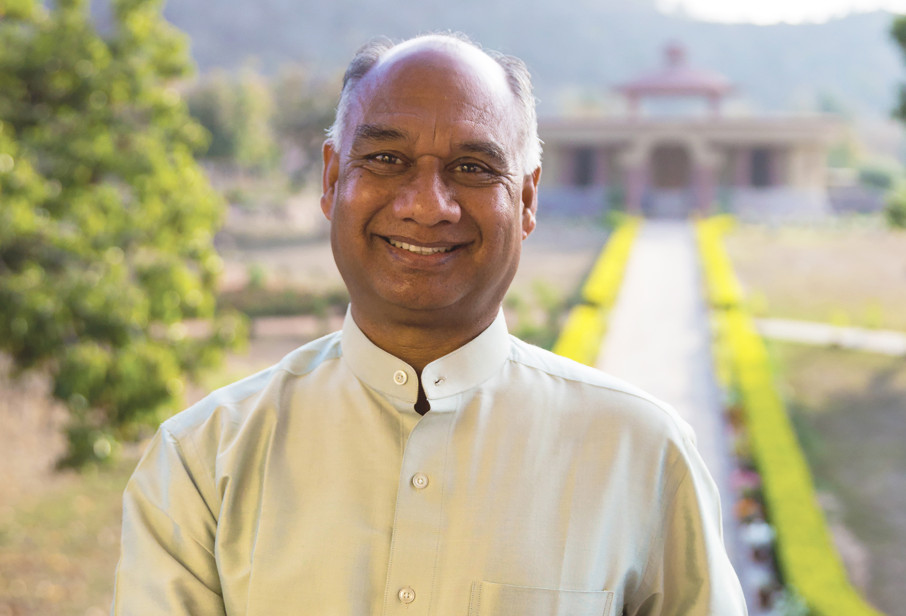
Spiritual head of the Himalayan Institute, Pandit Rajmani Tigunait, PhD is the successor of Swami Rama of the Himalayas. Lecturing and teaching worldwide for more than a quarter of a century, he is the author of fourteen books, including his recently-released The Secret of the Yoga Sutra, and his autobiography Touched by Fire: The Ongoing Journey of a Spiritual Seeker.
Pandit Rajmani Tigunait, PhD holds two doctorates: one in Sanskrit from the University of Allahabad in India, and another in Oriental Studies from the University of Pennsylvania. Family tradition gave Pandit Rajmani Tigunait, PhD access to a vast range of spiritual wisdom preserved in both the written and oral traditions. Before meeting his master, Pandit Rajmani Tigunait, PhD studied Sanskrit, the language of the ancient scriptures of India, as well as the languages of the Buddhist, Jaina, and Zorastrian traditions. In 1976, Swami Rama ordained Pandit Rajmani Tigunait, PhD into the 5,000-year-old lineage of the Himalayan Masters.
Khajuraho Sadhana Immersion—Fall 2016
REGISTRATION IS CLOSED
Dates: Oct 31st to Nov 14th 2016
Deposit: $500
Registration period:
Regular: Feb 1st–August 1st , Rate: $1750
Late: Aug 1st–Sept 15th , Rate: $2000
Khajuraho Sadhana Immersion—Spring 2017
REGISTRATION IS CLOSED
Dates: Feb 25th to Mar 11th 2016
Deposit: $500
Registration period:
Regular: Feb 1st–Nov 30th, Rate: $1750
Late: Dec 1st–Jan 15th, Rate: $2000
Two ways to register:
Register Online
Register online for your Khajuraho Sadhana Immersion. Click the button below, and complete the registration form. Your payment (deposit or in full) will ensure your space.
Register By Mail
Download Tour Participant Agreement (“TPA”). Print, read, complete, and sign. Mail your signed TPA with deposit or full payment.
Mail to:
Himalayan Institute Spiritual Excursions
Attn: Alat Shanti Tigunait
952 Bethany Turnpike
Honesdale, PA 18431 USA
A: A Sadhana Immersion is a program focused on spiritual practice and includes the opportunity for continued spiritual practice at Himalayan Institute India at Khajuraho and the Sri Vidya Shrine on campus. The Sri Vidya Shrine and the HII Khajuraho campus offer all that drew yogis and aspirants to the Himalayas in ancient times—extraordinary beauty, serenity, and spiritual energy that spontaneously transports us to our pure and pristine inner core. A Sadhana Immersion in this spiritually uplifting oasis is designed to help you accelerate your practice and become more firmly established in your experiential wisdom. The structured practice of hatha, pranayama, meditation, prayer, purashcharana, and personal guidance from Pandit Rajmani Tigunait (“Panditji”) are the central elements of this experience. But the most important element is the environment, which cannot be replicated.
Q: How can I prepare in advance for this Sadhana Immersion?
A: You may want to start, refine, and/or complete your practice in India or begin your practice now in preparation for your Immersion. The Sri Vidya Shrine in Khajuraho awaits you, with the prayer and trust that while you are there, you experience the love and compassion of the Sages, rekindle your own inner wisdom, and share the same with all following your return home. If you have not yet started a spiritual practice and wish to have a practice, please contact Pandit Rajmani Tigunait (“Panditji”) by emailing or calling Shelly Craigo: [email protected], (570) 647-1509 (office), or (570) 290-1778 (mobile).
Q: Where will I meditate?
A: The Sadhana Chamber and Maha Mandapa of the Sri Vidya Shrine are available for seated meditation. The shrine is open daily from 5:30 to 10:00 a.m. and from 3:00 to 9:30 p.m. The shrine is closed between 10:00 a.m. and 3:00 p.m.
Q: Can I meditate in the Garbha Griha?
A: The Garbha Griha is the innermost chamber of the shrine. The Garbha Griha is open during specific hours for paying your respects and having darshan of the sacred energy residing in that space. Sitting in the Garbha Griha is not permitted. The Sadhana Chamber and Maha Mandapa are available for seated meditation.
Q: Where can I do yoga?
A: Our large, covered outdoor pavilion is the primary location for practicing yoga. Covered verandas on the first floor of the main building and guesthouse are also available for hatha yoga practice. A large area on the upper level of the shrine, adjacent to the havan kund, is also available for hatha yoga if havan (fire offering) is not scheduled.
Q: What is there to do when practice is finished for the day?
A: After practice, there will be time for study, reading, journaling, walks in nature, contemplation, scheduled appointments for initiation into the Himalayan Tradition and spiritual guidance, and scheduled group activities. There are several interesting walking routes in the area and on campus which you may take advantage of, including the Siddha Baba hike, the palace walk, and a nature loop through the surrounding forest preserve. Our campus is also the perfect place for walking, bird watching (more than 46 species of birds, including some endangered species, have been identified on our campus), drawing, photography, and watching for monkeys and nilgai in the nearby hills.
Q: How many people will be there when I am on my immersion?
A: In order to enhance your immersion experience, each group will be limited to 45. All participants will be housed indoors.
Q: What’s the weather like in Khajuraho?
A: By the end of September, monsoon is generally over and the winter season gradually begins. Winter: October through February/mid-late March are the winter months in Khajuraho. Winters are cold with temperatures dropping to 40° F (4° C), or colder at times, and daytime highs ranging from 75° F (24° C) to 82° F (28° C). Highs in October and March may reach 90° F (32° C) or more.
A: Each participant is responsible for getting to India and to Khajuraho, the starting point of the Immersion on their own. Many U.S. and international airlines have flights to Delhi, India. On the east coast of the U.S., flights depart from New York (JFK or EWR at Newark, NJ) to Delhi. Other major airports throughout the U.S. offer flights to India. Numerous flight options to Delhi from other countries around the globe are also available. Check with one of the online providers, airlines, or your local travel agent for the flights most convenient for you.
Q: How do I get from Delhi to Khajuraho and back?
A: It is strongly recommended that you fly round-trip Delhi-Khajuraho-Delhi. Jet Air and Air India currently offer flights to Khajuraho from Delhi (Air India from Delhi only on Mondays, Wednesdays, and Saturdays). Air India and Jet Air offer flights from Khajuraho to Delhi. Schedules and carriers can change seasonally and as the airline industry in India expands. Check with these and other carriers for their current schedules and fares. Flights with 1 to 2 stops are recommended.
Q: Will someone meet me when I arrive in Delhi?
A: Arrival in Delhi is on your own. Metered taxis are available at the international arrivals area of Indira Gandhi International Airport. One-way fares range from INR 275 to INR 800 depending on the taxi hired and hotel location. Some Delhi hotels may offer transfers at no charge or for a fee; inquire when you make your room reservation.
Q: How do I get from my Delhi hotel to the airport?
A: Taxis are readily available at Delhi hotels or the hotel front desk will be happy to arrange for a taxi to take you to the airport for your flight.
Q: Will someone meet me when I arrive in Khajuraho?
A: An HI Khajuraho representative will meet you at the Khajuraho Airport for transfer to campus on the date the Immersion begins.
Q: Can I visit the town of Khajuraho during my immersion, and how do I get there?
A: You will have an opportunity to visit the town of Khajuraho on the day of the scheduled group town trip. If needed, you may also book a taxi to go into town during scheduled free time. The Institute’s 30- acre campus is 7 miles (11 km) from the world-famous Khajuraho temples, a UNESCO World Heritage Site. The main 22-temple complex, Jain temple complex, and temple of 64 Yoginis where Swami Rama first got a glimpse of the Divine Mother, are about a 30 minute taxi ride from our campus. For more information visit mptourism.com. Note: We have found that changing from a hectic daily routine to a quiet, meditative lifestyle takes time. To enhance that process, it is best to have fewer distractions. To help maintain inner focus, it is suggested that a participant remain on campus for the first week of an Immersion. Thereafter, it is helpful to limit off-campus trips for necessities to once per week, or as scheduled for group activities. This gives you the opportunity to participate more fully in the Immersion so you will gain the maximum benefit. We recommend that participants read Living with the Himalayan Masters, At the Eleventh Hour, Touched by Fire, and The Himalayan Masters, A Living Tradition for background on Khajuraho, and to learn more about Pandit Rajmani Tigunait, Swami Rama, and the Himalayan Tradition. It is not advisable to be off campus after sunset given the remote location of the HI Khajuraho campus. For your safety when going off campus, those on Immersion are asked to return to campus before dark This curfew is in effect whether hiking locally or going to town by car.
Q: Do I need a passport or visa?
A: A Passport valid at least 6 months after your return date and India visa are required. It is recommended that there be at least 3 blank pages in the back of your passport. Each individual is responsible for obtaining their passport and visa. Cox & Kings Global Services Pvt. Limited (CKGS) is the only authorized Service Provider for the Embassy of India and its Consulates across the USA for Visa support services. Note: According to the Consulate of India website, the Embassy of India and its Consulates in the USA do not recognize any other agency to provide Visa services. If you would like to look into the process for obtaining an India visa in the United States, information can be found at Cox & Kings website (www.in.ckgs.us). Those residing outside of the continental U.S., check with your local Indian consulate for visa requirements in your country of residence.
Q: Where do I apply for my visa?
A: Your India visa processing site depends on where in the United States you currently reside, also known as jurisdiction. You can find a listing of the states in each jurisdiction (“application centers”), in addition to the hours, addresses and contact information for each site by using the following links within the Cox & Kings website: Washington D.C., New York, San Francisco, Chicago, Houston, Atlanta. Those residing outside of the continental U.S., check with your local Indian consulate for details and visa requirements in your country of residence/citizenship.
A: No immunizations are required for travel to Delhi and Khajuraho. You’re welcome to check the Center for Disease Control and the World Health Organization websites for their list of recommended vaccines.
Q: Are there natural ways to enhance my health before going to India?
A: Himalayan Institute Chyawanprash is highly recommended in preparation for your journey to India, and anytime. Described in ancient Ayurvedic texts, Chyawanprash is a synergy of specifically selected herbs and fruits in a nutritive tonic. The principle herb Amla (Amalaki) is one of the world’s most concentrated naturally occurring sources of antioxidant Vitamin C. A spoonful a day of this 2,000 year old formula is a tasty way for people of all ages and constitutions to nourish mind and body, while supporting healthy immune function.
*Take it regularly for several months before your departure to strengthen and build your immune system.
Q: Is the water safe to drink in India?
A: Bottled (mineral) water is recommended when staying in hotels in India. Groundwater wells are the source of our water at our HII campus in Khajuraho. This well water is UV-treated, carbon-filtered and made available for drinking, and for filling your water bottle while on campus.
Q: Can I brush my teeth and do neti with the tap water?
A: The tap water in your room on our HII campus is safe for brushing your teeth. Use sterile bottled water in your Neti Pot everywhere. When in hotels, bottled water is recommended for brushing your teeth and rinsing your toothbrush.
*The statements made here have not been evaluated by the Food and Drug Administration. This product is not intended to diagnose, treat, cure, or prevent any disease. If taking any medication, consult with a healthcare practitioner before using this product. Do not use during pregnancy or lactation unless recommended by a healthcare practitioner. As with any herbal preparation, consider size, age, weight, constitution, and lifestyle as guidelines for use.
A: Each guest room is equipped with beds with mattresses and an en suite shared bath for shower or bucket bathing and a Western-style toilet. Two sheets, one pillow with cover, one thin wool blanket, one thick wool blanket, and one Indian-style towel are provided, as well as a mosquito net for the bed (seasonally). If you wish to use toilet paper, plan to bring a supply of your own (read more about this in “What to Bring” below.) Sleeping bags are essential during the months of November-February. There is no heat and electricity is unreliable in our area. Solar heated hot water is available on demand for bathing on our campus. Accommodations for the immersion are double to triple occupancy. Requests for singles or private accommodations cannot be confirmed in advance of your stay, are not guaranteed, and will incur additional charge, if they become available. Advise the immersion organizer of any special circumstances. For the comfort and safety of all during your stay, we ask that you avoid wearing perfumes, fragrances, or essential oils, or burning incense or candles in your room or elsewhere on campus or in buildings.
Q: Is laundry service available?
A: Laundry services will be available for a fee during the immersion.
Q: I will be traveling alone. Do you assign my roommates at HII Khajuraho?
A: Roommates of the same gender are assigned when an individual registers as traveling alone. If you have friends registering for the same Immersion dates and you agree to share accommodations, you may request a specific roommate or roommates. The Immersion Organizer will endeavor to honor requests for roommates. Couples may share with another couple in a 2-room suite.
Q: Will meals be provided during my stay on campus?
A: Lacto-ovo vegetarian breakfast, lunch, supper, and homemade chai one to two times per day are included in the cost of your stay. Meals are prepared with fresh ingredients from local growers. Meals and chai are self-serve, buffet-style, at specified times.
Q: Do you serve gluten-free and dairy-free (vegan) meals?
A: While we are unable to accommodate special dietary needs, dairy-free options are generally available at meals. With advance notice to the Immersion Organizer, gluten-free options may be available. Meals are prepared with wholesome vegetable oil and gently spiced.
A: A preparations letter will be sent after registration with a list of recommended items. Here is an overview only: Sturdy walking shoes, a sleeping bag (during winter months), clothing for layering including a coat or jacket for warmth on cold nights and mornings, a pair of shoes or slippers dedicated for indoor use in the Main Building and Guest House. If you plan to use yoga or meditation props, bring them with you, or bring a towel to use instead of a yoga mat to save space and weight in your luggage. Registered participants will receive a travel guide to India which includes a full list of recommended items, packing tips, and more. Bring soap, shampoo, and personal toiletries for bathing when on our campuses. Laundry service, for a fee, will be available, or you may choose the gentler approach and personally wash your laundry by hand. If you are taking prescription medication, bring an adequate amount with you. Although some medicines are available in India, their supply and quality are not reliable. Toilet paper can be found in India but isn’t always available. Even if found, the quality is likely to be different than what we are used to. If you want to use toilet paper on campus, bring it with you. The best thing, however, is to adjust to and practice “elimination management” Indian style—using water to rinse and a small towel to dry, rather than toilet paper, which often clogs septic systems and toilets.
Things to leave at home:
- hair dryer, curling iron, hair straightener, electric shaver, iron, hot water pot, heating coil, and similar electrical items
- too much clothing
- non-essential electronics (this is the perfect time to “unplug”)
Q: What’s the culture like and how should I dress?
A: Conservative, clean, loose-fitting modest attire is appropriate for your stay in India and at HII Khajuraho. Due to cultural customs in India, the immersion organizer asks women to refrain from wearing shorts of any length, capris shorter than ankle length, tops with spaghetti straps, halter tops, tank tops, plunging necklines or backs, sleeveless tops; form-fitting clothing; and short skirts or miniskirts. Men are asked to refrain from wearing muscle shirts. Shirts and footwear must be worn outside. Outside shoes are to be removed before entering the Shrine and other Institute buildings. Shoes or slippers designated for indoor use are to be worn in the Main Building and Guest House.
Q: Where can I change money?
A: Change currency into Indian rupees before exiting the customs area at the Delhi airport. Traveler’s checks are no longer widely accepted, therefore, plan to bring cash for exchange. State Bank of India, near the baggage claim area (across from carousel 14) and before the customs exit, is recommended for currency exchange. Count your rupees before leaving the window and be sure you are given an encashment certificate for your transaction. Retain this encashment certificate to use for exchanging any excess rupees at the end of your travel. ATM machines are also available in the baggage claim area and before you exit the airport, as well as in the town of Khajuraho. Currency may also be exchanged at Canara Bank in the town of Khajuraho.
Q: Can I get a local phone or local SIM card to use in my mobile phone?
A: Phone connections and service at HII Khajuraho is unreliable and generally poor. Phone connections in the town of Khajuraho are stronger and generally more reliable. Several local telephone carriers are located in the international arrivals area of Terminal 3 at Indira Gandhi International Airport. Inquire about options and cost at Idea upon arrival in India. Note: SIM cards purchased in Delhi may not be reliable in Khajuraho. If you plan to use a local SIM card in your GSM mobile phone, have your local service provider unlock the phone before your departure for India. CDMA phones may require additional attention to avoid roaming charges with a local SIM card. Check details with your service provider. A “pay phone” is also available for use while on campus for emergency and occasional calls to home and business. The rates, subject to change, are: INR 1 per minute for calls within India INR 8 per minute for calls to the U.S. and Canada INR 10 per minute for calls to the U.K. INR 10-15 per minute for calls to Europe (varies by country)
Q: Is internet available on campus?
A: Internet is available in the town of Khajuraho only. Several internet facilities and hotels offer wi-fi and wired connections at rates ranging from INR 40 per hour to INR 300 or more per hour (at hotels). Copies may also be printed for an additional per page charge. Rates are subject to change.
Q: Can friends visit me while I’m at HII Khajuraho?
A: In order to maintain the meditative atmosphere of campus and to maintain continuity of your Immersion, we recommend that you not invite visitors during your short stay at HII Khajuraho. Unexpected drop-ins and casual visitors will be turned away by the gatekeeper. Prior arrangements and approval of the manager are required for anyone wishing to have a tour of campus. Approved visitors must sign in with the gatekeeper, be announced upon arrival, and be accompanied by a staff member during their visit.
A: Payment in U.S. dollars by check or credit card can be made to our Excursions office in Honesdale, Pennsylvania. Paying by check helps to support the Institute’s global humanitarian efforts such as our Total Health Revolution, clean water projects, bringing water wells to villages in need, educational scholarships, tree plantation, and more. See the Application for Sadhana Immersion for additional terms and conditions. To pay your balance due by credit card, call (800) 822-4547 x6 or (570) 253-5551 x6.
Q: How do I register for my Sadhana Immersion?
A: Click here to visit the registration page.
Q: What if I need to cancel?
A: Should you need to cancel your registration, kindly notify us in writing and refer to the Cancellation policy outlined in the terms and conditions of your registration form.
Q: Can I change my dates of stay after I apply?
A: We ask that you carefully choose the dates for your immersion; however, if you need to change your dates after you apply, your new registration request will be contingent upon availability of space for the new dates. A change of immersion dates will be treated as a cancellation and a new registration will be required; cancellation and administrative fees apply. Refer to the Application for Sadhana Immersion for details.
Q: Can my immersion be extended after I arrive in Khajuraho?
A: It may be possible to extend your stay after you arrive in Khajuraho, contingent upon availability of space and prior approval. The rate in effect at the time of request for a pre-approved extension is payable in advance and can be paid in India in U.S. dollars or charged to your credit card in U.S. dollars. Additional travel or other expenses resulting from extending an immersion are to be borne by the participant.
